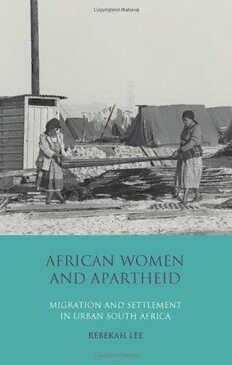
African Women and Apartheid: Migration and Settlement in Urban South Africa (International Library of African Studies, Volume 25) PDF
297 Pages·2009·1.784 MB·English
Most books are stored in the elastic cloud where traffic is expensive. For this reason, we have a limit on daily download.
Preview African Women and Apartheid: Migration and Settlement in Urban South Africa (International Library of African Studies, Volume 25)
Description:
A key mechanism of apartheid in South Africa was the set of restrictions placed on the movements of Africans; in particular, African women were subject to lives of daily surveillance and highly regulated housing, employment and mobility. Here Lee explores the lives and testimonies of three generations of African women in Cape Town during the apartheid (1948-94) and post-apartheid periods. Through life histories and a wealth of evidence, Lee considers how African women differently experienced apartheid, offering an intimate account of their attempts to locate "home" in the urban setting. The various strategies of settlement African women crafted over five decades provide a compelling portrait of adaptation, resilience and change. Drawing together perspectives from anthropology, history, human geography and development studies, African Women and Apartheid will be valuable to anyone with interests in South African culture and society, gender, urbanization, the African family, oral history and memory.
See more
The list of books you might like
Most books are stored in the elastic cloud where traffic is expensive. For this reason, we have a limit on daily download.
